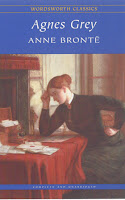8.23.2012
Felix Holt, The Radical
First off let me say this, I am not a political person. I'm not interested in politics *gasp* on the whole, I think politicians are liars (and that's the nicest thing I can say) and anything having to do with the subject quickly elicits my typical response: glazed eyes, nodding off, little drool at the corner of my mouth... So when I studied up on Felix Holt, The Radical and found out that it was George Eliot's "Most Political Novel" I panicked. The task seemed insurmountable and the odds of me liking this novel were improbable.
I didn't do Eliot justice. How could I doubt her genius?! READ IT. If you don't like political stuff, it's okay, it's not what you think. Yes it's set during the backdrop of the first Reform Bill, and Felix is known as a Radical... But there's so much more going on there than just political stuff, and even that is more interesting than you'd think. Mr. Lyon is a fantastic character and when his history is revealed in chapter 6, it brings such warmth to the story and illuminates Esther's own personality so much better. Long story short, I recommend this book to anyone who hasn't read it before, it helps if you've read a book or two of Eliot's beforehand, but it's not essential as you'll quickly get used to her writing style. Here's a couple of good quotes from Felix Holt:
She cried bitterly. If she might have married Felix Holt, she could have been a good woman. She felt no trust that she could ever be good without him. p.419
A woman must choose meaner things, because only meaner things are offered to her. Her lot is made for her by the love she accepts. p.525
8.20.2012
Agnes Grey
Historically, Anne Bronte has been much overlooked and overshadowed by the incredible brilliance of her illustrious sisters. However, I categorize her on the same level as Charlotte and Emily namely because of her wonderfully vivid style of writing. A defining characteristic of the Bronte sisters is the way they wrote about things they knew a little of and laced them with ideas and situations they could only imagine. Agnes Grey is a bit of a mold-breaker in that it's based mostly on Anne's personal experiences as a governess.
Being a governess wasn't an incredibly desirable job, yet many novels sort of gloss over the trials they encountered; not so with Agnes Grey. Often throughout the novel it seems like Anne penned the real-life frustrations she encountered as a governess and then later changed the names for the sake of her story.
At the start of the novel, Agnes is a little difficult to sympathize with because of the reserved way she relates her story. As with so many novels, the heroine doesn't open up and become more three-dimensional until the love interest comes on the scene. Agnes and her unspoken love of Edward Weston brings bittersweetness into the novel, and that trial gives the story its beauty. It's an understated short novel, and it's well worth a read.
Here's a poem Anne wrote shortly after Emily's death and aptly named by Charlotte:
Last Lines by Anne Bronte-
I hoped, that with the brave and strong,
My portioned task might lie;
To toil amid the busy throng,
With purpose pure and high.
But God has fixed another part,
And He has fixed it well;
I said so with my bleeding heart,
When first the anguish fell.
A dreadful darkness closes in
On my bewildered mind;
Oh, let me suffer and not sin,
Be tortured, yet resigned.
Shall I with joy thy blessings share
And not endure their loss?
Or hope the martyr's crown to wear
And cast away the cross?
Thou, God, hast taken our delight,
Our treasured hope away;
Thou bidst us now weep through the night
And sorrow through the day.
These weary hours will not be lost,
These days of misery,
These nights of darkness, anguish-tost,
Can I but turn to Thee.
Weak and weary though I lie,
Crushed with sorrow, worn with pain,
I may lift to Heaven mine eye,
And strive to labour not in vain;
That inward strife against the sins
That ever wait on suffering
To strike whatever first begins:
Each ill that would corruption bring;
That secret labour to sustain
With humble patience every blow;
To gather fortitude from pain,
And hope and holiness from woe.
Thus let me serve Thee from my heart,
Whate'er may be my written fate:
Whether thus early to depart,
Or yet a while to wait.
If thou shouldst bring me back to life,
More humbled I should be;
More wise, more strengthened for the strife,
More apt to lean on Thee.
Should death be standing at the gate,
Thus should I keep my vow;
But, Lord! whatever be my fate,
Oh, let me serve Thee now!
8.13.2012
The Tenant of Wildfell Hall
If Miss Anne Bronte was intent on writing her novel in a very different fashion, she nailed it. It's an interesting notion to introduce a seriously reserved character who's supposed to be the heroine, and then to show her warmer side once you've read much of the story. The most pervasive themes within the story were love and unrequited love, Bronte interwove those themes impressively.
I'm a serious literary lover, I have untold passionate crushes on many leading men in novels (i.e. Captain Wentworth, Mr. Darcy, John Thornton, Mr. Rochester etc.)... However, Gilbert Markham isn't one of them. The thing that sets those men apart is their serious love of their women, no matter the circumstances, even when they hate their objects of desire, they still love them. This is a serious accusation to say that a Bronte sister's leading man is a little less than impressive, but I couldn't help feeling that in the end, not too much separated Markham from Mr. Hargrave.
Think about it, both men are captivated by Helen, and both men then take the very natural masculine stance of feeling deeper in love when they find she's a damsel in distress. The only difference between the two men is the encouragement Markham received and the serious discouragement Hargrave received. Perhaps this less than impressive hero is presented in such an inhibited way because the novel itself was pretty constrained.
This is not to say it's a bad novel, far from it! I love Anne Bronte's novels as much as her sister's, it's just a much more sedate storyline than the passionate Wuthering Heights or mysterious Jane Eyre. Interestingly, the film version with Toby Stephens, Tara Fitzgerald and Rupert Graves is pretty amazing. I have to say, Toby Stephens kinda makes you just fall in love with whoever he's playing, so in an exceedingly rare instance, I find the film version of Markham much more likeable than the original literary version.
First post of 2012, WOO!
Ah,Time. Yet again I've left off writing on this blog (I've posted on my other blog more recently), but I haven't left off reading the novels on my epic list. Much to the disappointment of my 3 or so readers, I won't be posting about all of the novels I've finished... I'll just write about one or two.
I've recently read:
Silas Marner -George Eliot
Hamlet - William Shakespeare
The Tenant of Wildfell Hall - Anne Bronte
Agnes Grey - Anne Bronte
The Mill on the Floss - George Eliot
Felix Holt - George Eliot
Cranford - Elizabeth Gaskell
North and South - Elzabeth Gaskell
On a whole other note, I'm in training for the Long Beach Marathon Bike Tour... Of course, I'm taking it easy now because of the unnatural humid heat out here! But after the heat wave breaks, get ready to see me out there on the trails on my gorgeous little Schwinn!
I've recently read:
Silas Marner -George Eliot
Hamlet - William Shakespeare
The Tenant of Wildfell Hall - Anne Bronte
Agnes Grey - Anne Bronte
The Mill on the Floss - George Eliot
Felix Holt - George Eliot
Cranford - Elizabeth Gaskell
North and South - Elzabeth Gaskell
On a whole other note, I'm in training for the Long Beach Marathon Bike Tour... Of course, I'm taking it easy now because of the unnatural humid heat out here! But after the heat wave breaks, get ready to see me out there on the trails on my gorgeous little Schwinn!
Subscribe to:
Posts (Atom)






 }
}
